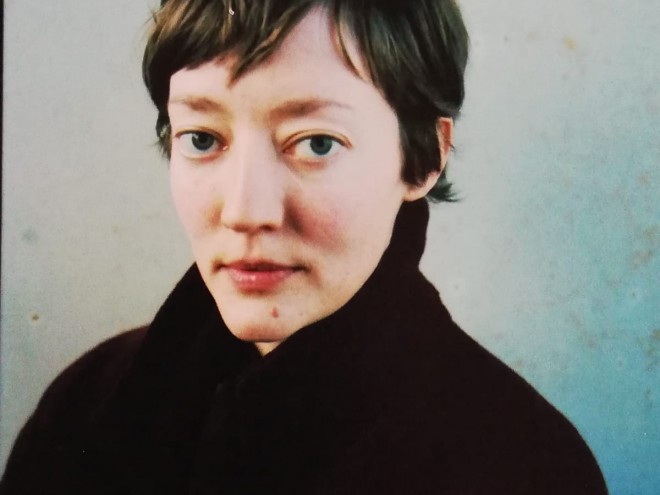
Victor Roussel: At the beginning of new skin, you mention the names of anti-colonialist thinkers such as Achille Mbembe, and feminists and ecologists such as Donna Haraway and Anna Tsing. What influence have their ideas had on your artistic research?
Hannah De Meyer: Reading those authors changed my view of the world and got me thinking about the political role of art. Their writings demonstrate how language can be activated, and they deconstruct the connections between poetry and activism. But they also changed the structure of my brain. That’s precisely where the strength of their work lies. The knowledge they convey through language and the images they arouse also go through the nervous system, and I try to evoke that on stage by letting the thoughts and images that are in my mind also go through my body. Following their example, I have not attempted to write or structure my show in a dramatic manner. The script and performance are more like a body that is moving, an insect skimming from one landscape to another and always changing texture. I collect texts from different sources; I copy them, change and rearrange them until I get a story that works for me, images that are my own. But the show still reflects the voices that have shaped it. Even though I am alone on stage, their ghosts remain part of the performance.
V. R.: Has working in an institution like Toneelhuis made you question the role of the artist?
H. D. M.: P.U.L.S. in the first place offered me the chance to become part of an institution, Toneelhuis, at a time when the functioning and structure of institutions is being discussed. Our structures are based on categories that are seen as universal and objective, and on the hierarchies that stem from them (men are superior to women, whites are superior to people of colour, humans superior to non-humans…). These categories form the basis of our history, our self-image as individuals and as a society. Working in an institution has allowed me to experience these hierarchies personally and to question them: What constitutes culture, what constitutes art? What words are considered legitimate in cultural institutions? Through my experience in P.U.L.S. I also became more aware of my position as an artist. On the one hand I am a woman, I have endured and dealt with sexual abuse and I work in a predominately-male organization. And on the other hand I am white, I belong to the upper middle class, I receive a full-time salary from Toneelhuis for four years long and I have been given the chance to present my work in Paris. All of these contradictions and tensions between my work and the institutional framework are like compost that acted as a fertilizer for new skin.
V. R.: new skin seems to be asking what can be created amongst the ruins and arouse anger. Can theatre be a place for experiencing an alternative view of the world?
H. D. M.: I think that each body and each story can spark an alternative view of the world. Theatre perhaps allows us to experience a vulnerable and sacred body, that of the actor on stage. Theatre can make us aware of the necessity of caring for the other. I think New Skin is also about establishing ties between the human body and the non-human bodies that surround us – animals, insects, stones, water. The script not only talks about ties, it also tries to embody them. Which makes me think of a statement by Donna Haraway: “Our task is to make trouble, to stir up potent response to devastating event, as well as to settle troubled waters and rebuild quiet places.
← Back to overview